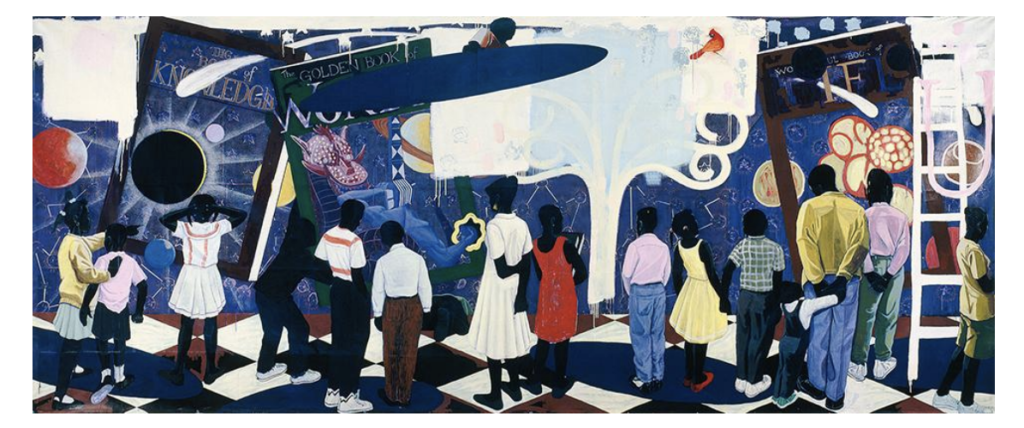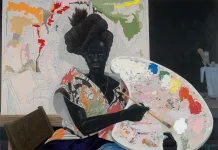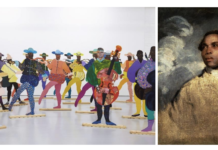
The Royal Academy of Arts presents the largest survey of celebrated American artist and Honorary Royal Academician Kerry James Marshall ever to be shown in Europe. Marking the artist’s 70th birthday, this major solo exhibition explores Marshall’s expansive career to date. Kerry James Marshall: The Histories features over 70 works, bringing together primarily paintings, as well as examples of the artist’s prints, drawings and sculpture, from museums and private collections across North America and Europe. The exhibition is the first institutional presentation of the artist’s work in the UK since 2006 and includes a dramatic new series of paintings made especially for the show.
Revered as one of the most influential contemporary history painters working today, Marshall’s powerful, large-scale paintings address themes including the Middle Passage and the legacies of the Civil Rights and Black Power movements; portray individuals such as Olaudah Equiano and Harriet Tubman; and create monumental scenes depicting contemporary Black life, elevating the everyday to the epic. He centres Black figures in paintings built on principles codified in the tradition of Western picture making, which he encountered in books and museums available during his childhood. Marshall’s work is informed by art history, contemporary culture, Afrofuturism, and science fiction. He engages hard questions about the past, celebrates ordinary life, and imagines a more optimistic future.
Marshall works in series and cycles, as reflected in the exhibition’s thematic arrangement, which showcases 11 groups of works made between 1980 and the present. The exhibition opens with works from the 2000s and 2010s, highlighting Marshall’s long interest in the disciplines of art taught in institutions such as the Royal Academy. The centrepiece of the opening room is The Academy, 2012 (Private Collection) in which the male model in a life class strikes the classic Black Power salute pose with raised fist. The second room looks at Marshall’s earliest mature works from the 1980s, including A Portrait of the Artist as a Shadow of His Former Self, 1980 (Los Angeles County Museum of Arts, Los Angeles) and Invisible Man, 1986 (Private Collection). This section establishes Marshall’s concern with depicting Black figures, while also provoking questions about representation in art history and who and what has been excluded.
The two largest galleries are devoted to Marshall’s ambitiously composed, large-format paintings that record scenes of everyday life in Black America. Deeply influenced by artists such as Edouard Manet, Gustave Caillebotte, Georges Seurat and other painters of modern life, and conscious of the absence of large-scale images of daily life in the work of many Black artists before him, Marshall depicts Black families picnicking in the park, lovers dancing, children playing in communal gardens, and friends hanging out in hair salons, for example in School of Beauty, School of Culture, 2012 (Birmingham Museum of Art, Birmingham (AL)). At the centre of this room hangs the vast Knowledge and Wonder, 1995 (Legler Regional Library, Chicago Public Library, Chicago), Marshall’s largest painting to date, exhibited for the first time outside of Chicago.
The exhibition continues with works addressing the history of the Middle Passage (e.g. Great America, 1994 (National Gallery of Art, Washington DC)) and the Civil Rights movement (e.g. the Souvenir, 1997-8 and Vignette, 2003 – 2014, series). A section bringing together imagined portraits of historically significant Black figures such as Scipio Moorhead and Harriet Tubman, question how historical portraits can be created in the absence of archives and earlier representations of individuals. On display in the final galleries is Wake, 2003 – ongoing (Rennie Collection, Vancouver), an accumulative sculpture which is decorated with new additions each time it is exhibited. The exhibition culminates with a new, never seen before body of work. These eight paintings explore episodes in African history and the transatlantic slave trade, particularly the active role African slave traders played in enslavement.
Kerry James Marshall: The Histories follows in the RA’s tradition of celebrating its Royal Academicians and Honorary Royal Academicians, continuing a strand of programming that has showcased some of the most important living artists including Marina Abramović, William Kentridge, Antony Gormley, Ai Weiwei, Anselm Kiefer and Anish Kapoor. Marshall was elected as an Honorary Royal Academician in 2022.
Get your tickets here
WRITTEN BY: Nura Arooj











